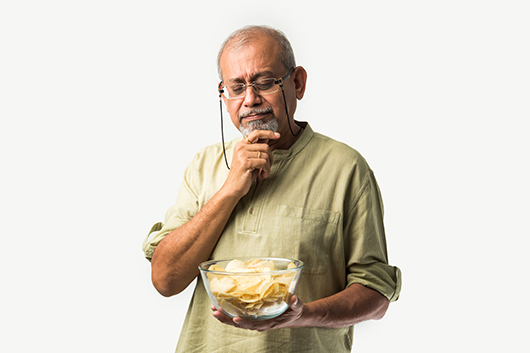Emotional eating is quite common in the elderly as they turn to the comforts of food when experiencing stress, disappointment, or loneliness. When seniors want to calm their nerves, it is easy for them to grab a packet of chips instead of an apple. It is important for them to understand that it is a temporary fix. Foods such as chips, cakes, biscuits, and ice cream are designed to have a special combination of sugar, fat, and salt in them to make one feel good temporarily. Also, they are addictive in nature – which means when seniors are faced with stressful situations, they turn to these foods and can get stuck in a loop. As one of the leading retirement homes in India, we share a few insights on how emotional eating can be stopped: 1. Understand the signs of emotional eating: Everyone eats for reasons other than hunger once in a while. However, the first step seniors can take to stop emotional eating is to recognise the problem. Here are some common signs of emotional eating: Change in eating habits during stressful periods Eating despite feeling full Constantly looking for snacks even when not hungry Eating when feeling bored Eating to feel good 2. Identify emotional eating triggers: There are several reasons why seniors develop an unhealthy relationship with food. To figure out what triggers emotional eating, seniors can keep a food journal. Writing down when and what they eat can help seniors identify their eating patterns. 3. Change response to triggers: Once identifying the emotional eating triggers, seniors can change the way they respond to them. Instead of reaching out for comfort food, seniors can: Take a short walk. Take time to think about their feelings. Are they really hungry? Or is it anxiety or a stressful situation that is bothering them? Use the opportunity to pen down their thoughts. This may help them gain a new perspective about the problem they are facing. Join a hobby class to avoid overthinking. Call a friend and catch up with him or her. Have a healthy snack instead of salt-laden chips or carbonated drinks. 4. Talk to a counsellor: Taking help from experts can help seniors understand their emotions and eating habits. A counsellor along with a nutritionist can help come up with a diet plan that is healthy and sustainable in the long run. Know more about senior living in India – explore our retirement communities Our retirement homes in India are designed to promote positive ageing. Our residents are encouraged to follow new passions and make new friends through different community activities. We offer an extensive range of services to ensure that our residents enjoy a fulfilled and a worry-free retirement life. To know more about our senior living communities, call us at +91 8884555554.
Read More







